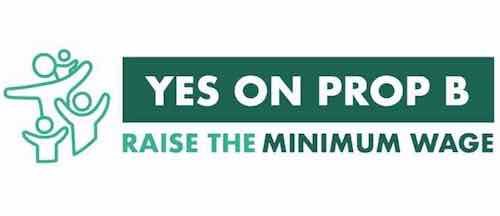Please Vote Yes on Prop B to Raise Missouri’s Minimum Wage
A lot of people fear increasing minimum wages, but where it has increased the dire predictions have not come true.
As the Federal Reserve Bank of Chicago found in a 2011 study, every dollar increase in the minimum wage corresponds with an annual increase in consumer spending per minimum wage household by $2,800. It makes sense. Elevating wages strengthens consumers’ buying power. Workers with more money in their pockets are also consumers who support local businesses, creating a virtuous cycle of growth and opportunity for our residents and our local economy.
There will always be Chicken Littles who are sure the sky is falling in the face of progress, but Chicago has proven them wrong. The city that works has clearly shown fair pay and a strong business climate can go hand-in-hand. (Crain’s Chicago Business)
When those at the bottom get a raise the money gets spent immediately. It often gets spent locally. This is true for big cities, and in rural communities. Yes, some businesses will have higher wage costs but they’ll likely see higher revenues as people have more money to spent.
Will raising the minimum wage have an effect on taxes and taxpayers?
Because people who earn minimum wage are those most likely to spend their income and spend it with local small businesses for basic necessities like food and clothing, it is estimated by the state of Missouri that state and local government tax revenue could increase by as much as $214 million dollars.
Additionally, the extra money spent by low-wage workers gets funneled back to businesses large and small that need to hire more workers to keep up with the increased demand, helping to create even more economic growth. That’s great for those small, local businesses and it’s great for Missouri taxpayers. (Raise Up Missouri FAQ)
In November Missouri voters will consider a slow graduated increase of the minimum wage, here’s the ballot language for Proposition B:
Do you want to amend Missouri law to:
- Increase the state minimum wage to $8.60 per hour with 85 cents per hour increase each year until 2023, when the state minimum wage would be $12.00 per hour;
- Exempt government employers from the above increase; and
- Increase the penalty for paying employees less than the minimum wage?
State and local governments estimate no direct costs or savings from the proposal, but operating costs could increase by an unknown annual amount that could be significant. State and local government tax revenue could change by an unknown annual amount ranging from a $2.9 million decrease to a $214 million increase depending on business decisions. (Raise Up Missouri)
The full detailed language can be viewed here.
Missouri’s current minimum wage is $7.85/hour. Three border states (Oklahoma, Kansas, & Iowa) have a lower minimum wage than Missouri — all are the same, $7.25. The three other border states (Arkansas, Nebraska, & Illinois) have higher minimum wages than Missouri. Of the three that are higher, they range from $8.25 (Illinois) to $9 (Nebraska).
Hourly workers aren’t just teens, they include all sorts — including Yale-educated actors like Geoffrey Owens:
He went on to say that he took the job at the grocery store because it allowed him the “flexibility” he needed to stay in the entertainment business.
Owens still acts and has been teaching acting classes for several years. He has a net worth of $300,000. In addition to his work on The Cosby Show over the years, Owens has appeared on episodes of Law & Order, Law & Order: Special Victims Unit, That’s So Raven, Boston Legal, Las Vegas, Medium, Without a Trace, Flashforward, The Secret Life of the American Teenager, It’s Always Sunny in Philadelphia, and The Affair.
Owens worked at Trader Joe’s for 15 months but had to quit because of the unwanted attention, however, the company said that he is welcome to come back anytime. (Source)
Owens is the son of a former librarian turned congressman (since retired, deceased). Hourly workers might be 17…or 57, but they’re working and their earnings will likely be spent — going back into the economy.
Here are the results of the recent non-scientific Sunday Poll:
Q: How do you plan to vote on Proposition B in the November 2018 midterm election?
- Definitely no 4 [19.05%]
- No 0 [0%]
- Leaning no 0 [0%]
- Unsure 2 [9.52%]
- Leaning yes 4 [19.05%]
- Yes 1 [4.76%]
- Definitely yes 9 [42.86%]
- I’m not a Missouri voter 1 [4.76%]
Please vote YES on Prop B on November 6th.
— Steve Patterson
